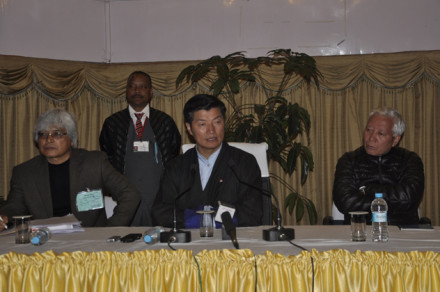 SHILLONG: Tibetan political leader Dr. Lobsang Sangay said it is in the geopolitical and environmental interest of Asia, including India, to support Tibetans in resolving the issue of Tibet through dialogue with China.
SHILLONG: Tibetan political leader Dr. Lobsang Sangay said it is in the geopolitical and environmental interest of Asia, including India, to support Tibetans in resolving the issue of Tibet through dialogue with China.
Addressing a press conference in Shillong today, Sikyong: “India has a very important role to play to resolve the issue of Tibet as the relationship between India and Tibet goes back to centuries. His Holiness the Dalai Lama always says, India is our guru and we are India chelas because we follow Buddhism based on Nalanda tradition. In ancient times, scholars from Nalanda university were invited to Tibet and they preach school of Buddhism which we practice today. So the Nalanda tradition is best preserved by the Tibetan people in this present world.”
“Secondly, Tibet is vital for the whole Asia, particularly India, from the environmental perspective. Billions of people in Asia including China and India, depend on major rivers such as Brahmaputra, Sutlej, Indus, Mekong which originate from Tibet. Diversion of rivers, deforestation and mineral exploitation taking place in Tibet under the Chinese government will have serious repercussions on the whole of Asia, he said.
“Thirdly, a solution to the issue of Tibet will usher peaceful boundary between India and China. Historically, Tibet served as a buffer zone between the two countries before its invasion by China. “So India could play a very constructive role to resolve the issue of Tibet. Having said that, we always remember India has been the most generous country for Tibetan people. The Indian government has been very supportive on humanitarian issues as well,” he added.
Responding to a question China’s frequent aggression in Arunachal Pradesh, Sikyong said: “As I mentioned, Simla agreement signed between the governments of Tibet and British India demarcates the border between India and Tibet in 1914. McMohan Line is the preferred border for India. So as far we are concerned our stand is very clear. The incursion takes place some areas do not clear demarcation. When Tibet was free there was no dispute whatsoever.”
Responding to a question on the prospects of His Holiness the Dalai Lama’s return to Tibet, Sikyong said His Holiness would return to his homeland Tibet soon.
“His Holiness will very soon return to Tibet. The universal slogan is we want to see the return of Dalai Lama to Tibet. Given a choice, Tibetans will like to be led by a Tibetan rather than governed by the Chinese,” he said.
“That’s why I left America; I left my job at Harvard to come to India so that we can all go back to Tibet,” he said.
“The Central Tibetan Administration follows the middle-way-policy (meaning between repression and separation), as we want to see an immediate end to the sufferings of the people in Tibet, for which we are willing to compromise in seeking separation from China, if we are given full autonomy in future,” he added.
Dr Sangay, who took over political responsibilities from the Dalai Lama in 2011, said the Tibetans are looking forward to the Chinese leadership to resolve the Tibet issue. “Since January 2010, we didn’t have any formal dialogue with the Chinese government. We believe in a peaceful dialogue to solve the issue,” he said.
“We look forward to the new Chinese leadership. We hope they will also believe wisely that dialogue is the way to solve the issue to Tibet for their own interest as they want respect from the international community and they ought to show respect to the Tibetan people,” he said.
On self-immolations in Tibet, he said: “The universal slogan of those who self-immolate is they want to see the return of the His Holiness the Dalai Lama to Tibet and by getting general autonomy, we are fulfilling that and also restoring the freedom and dignity of the people of Tibet.”
“Tibetans are frustrated and desperate due to the political repression, economic marginalisation, environmental destruction, social discrimination, cultural assimilation of the hardline Chinese policies towards them (Tibetans),” he said.
